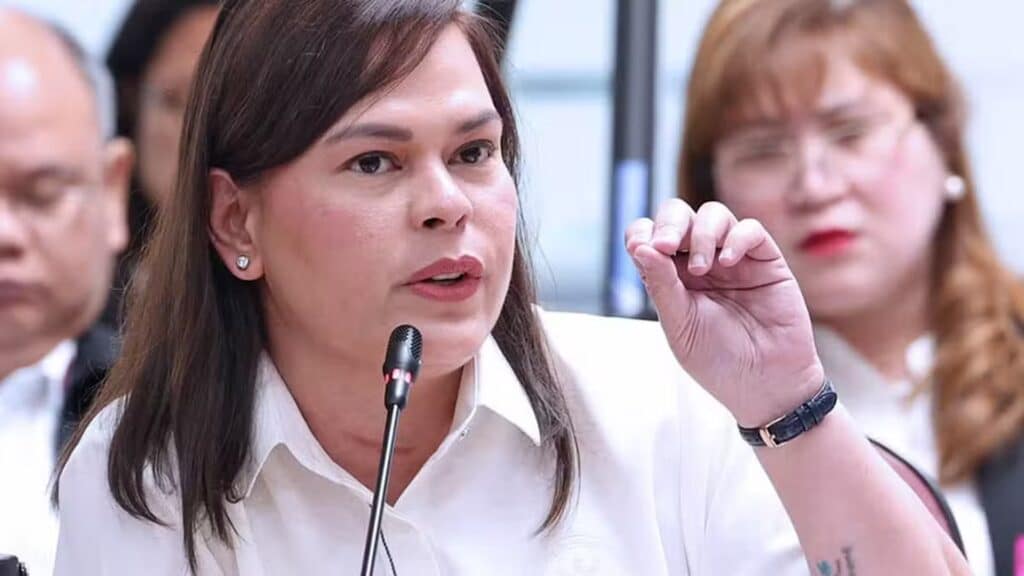Vice President Sara Duterte has refused to explain publicly how she used the millions in confidential funds allocated to the Office of the Vice President (OVP) and the Department of Education (DepEd) during her leadership, citing “national security” as the reason.
She emphasized that she would only account for these funds to the Commission on Audit (COA) and argued that the House of Representatives has no authority to question her use of the discretionary funds.
Speaking at a press conference on Wednesday in the OVP central office in Mandaluyong City, Duterte refused to offer an explanation about the unusual names seen in the acknowledgment receipts (ARs) of her confidential funds in the past two years.
READ: VP Sara Duterte considering hiring private security force
“No, no, I will not explain,” Duterte told reporters when asked about the veracity of the names in the receipts.
No records
The House said the Philippine Statistics Authority (PSA) found no records of them in the national registry.
“I will not give an explanation because it will entail that I will [have to] explain intelligence operations. It will really compromise how they work,” she said. “So, no, no explanation will be given to members of the House of Representatives.”
The House committee on good government and public accountability has been looking at the expenditures of the total P612.5 million in confidential funds by the OVP and DepEd in 2022 and 2023.
The committee found several acknowledgment receipts that contained names that they and even the public found unusual, like “Mary Grace Piattos,” which suspiciously looks like a composite of a local restaurant and popular snack brand.
The PSA confirmed that “Mary Grace Piattos” had no birth, death or marriage records. It said 405 other names were nonexistent.
Legal basis
Duterte insisted that she would have to give out secret information if she disclosed the true identities of the recipients of the confidential funds.
“I cannot explain confidential funds because it will entail explaining intelligence operations and there is a law that prohibits officials who gathered information because of their office to divulge it in public,” she said.
She referred to the antigraft and corruption law, which penalizes state employees who divulge “information of a confidential character, acquired by his office or by him on account of his official position to unauthorized persons, or releasing such information in advance of its authorized release date.”
The Vice President added that any responses she may give about the supposed fictitious names may “add to the cases that may be filed against me.”
Two impeachment complaints have been filed against her.
She also said she had “nothing to do with the preparation of the ARs.”
“It went down to the grassroots level. So, I had nothing to do with the preparation of the ARs. I was up here in the structure and the money went down for information,” Duterte said.
“The confidential funds we used for our work had to do with national security. All the programs and projects of the Office of the Vice President target poverty alleviation,” she said. “There is a direct correlation between poverty and national security.”
‘Threats to education’
As for DepEd, Duterte explained that “there are still so many threats to education, not just insurgency.”
“We wanted to target projects of the Department of Education as well in the most vulnerable areas and schools, that is why we needed confidential funds,” she said.
Lawmakers and observers are comparing not just Duterte’s confidential funds but her entire budget allocations with those of her predecessors.
Her immediate predecessor, Leni Robredo, got P428.618 million, with no confidential funds.
All of the most recent vice presidents—Jejomar Binay, Noli de Castro, Teofisto Guingona, Gloria Macapagal-Arroyo and Joseph Estrada—received much smaller allocations during their first full year in office after election compared to her whopping P2.3-billion budget for 2023.
Four of them got confidential funds—Binay (P6 million), De Castro (P6.59 million), Guingona (P5.1 million) and Arroyo (P3 million)—during their second year as vice president. —WITH A REPORT FROM INQUIRER RESEARCH
